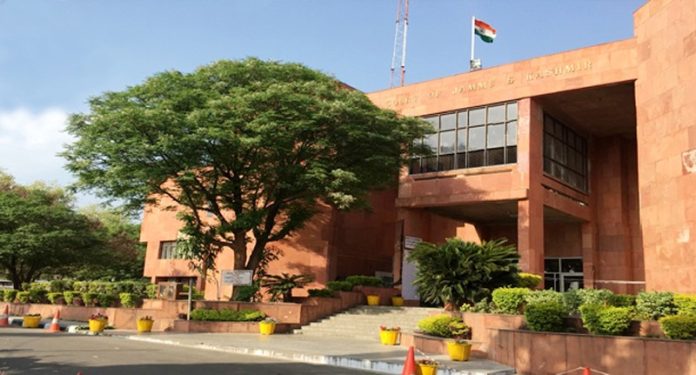‘State can’t arrogate beyond Constitutional provision’
Mohinder Verma
JAMMU, Nov 27: Stating that right to property falls within the realm of human rights, High Court of Jammu & Kashmir and Ladakh has held that State and its agencies being governed by the rule of law cannot arrogate itself to status beyond which is provided by the Constitution.
Follow the Daily Excelsior channel on WhatsApp
These observations were made by Justice Wasim Sadiq Nargal while dealing with a petition whereby it was submitted that the petitioner’s proprietary land was occupied by Army in the year 1978 but till date neither he has been given any rent nor any proceedings have been initiated for formal acquisition of land.
The case of the petitioner was that Division Bench of the High Court vide Order dated 20th September, 2022, had directed the Deputy Commissioner Kupwara to get fresh survey conducted with regard to the land in the presence of the petitioner as well as the Army officials and submit report with regard to the possession of the land at village Tangdhar. The report so submitted on the directions of the Division Bench clearly indicates that the land in question is in possession of Army since 1978 and no rental compensation was ever paid to the petitioner.
After hearing Advocate Saima Mehboob for the petitioner—Abdul Majeed Lone, son of Sikender Lone of Tangdhar Karnah and Deputy Advocate General Hakim Aman Ali, DSGI T M Shamsi with Advocate Shagufta for the respondents, Justice Wasim Sadiq Nargal observed, “the right to property is now considered to be not only constitutional or statutory right but falls within the realm of human rights”, adding “human rights have been considered in the realm of individual rights such as right to shelter, livelihood, health, employment etc and over the years, human rights have gained a multifaceted dimension”.
“The respondents without following due process of law have acquired the land of the petitioner that too without paying the rental compensation to him, which is violative of the Constitutional right of the petitioner”, High Court said, adding “it is emphatically clear that no one can be deprived of his/her property other than by following procedure prescribed under law”.
“The State and its agencies cannot dispossess a citizen of his property except in accordance with procedure established by law. The obligation to pay the compensation though not expressly included in Article 300-A can be inferred from the Article”, High Court said, adding the State in exercise of its power of “Eminent Domain” may interfere with the right of property of a person by acquiring the same but the same must be for a public purpose and therefore, reasonable compensation must be paid.
“In a democratic polity governed by the rule of law, the Union of India could not have deprived the petitioners of their property without the sanction of law and it is obligatory on part of the Union to comply with the procedure for acquisition, requisition or any other permissible statutory mode”, Justice Nargal said, adding “the State being a welfare state governed by the rule of law cannot arrogate itself to status beyond which is provided by the Constitution”.
The High Court further said, “the law has been settled at naught by the Supreme Court in various authoritative pronouncements that right to property in view of the Article 300-A of the Constitution of India is a very important human right and no one can be deprived of his/her property, otherwise, than following due procedure of law and it is a recurring cause of action”, adding “this court is of the view that the action of the respondent-Union of India is illegal and unconstitutional which cannot sustain the test of law in the light of the stand taken by the Revenue Authority”.
Accordingly, High Court directed the Deputy Commissioner Kupwara to constitute a team of revenue officers within two weeks headed by Tehsildar concerned by associating the petitioner and other stake holders who shall take necessary steps for assessment of rental compensation with regard to the occupation of land in question by the Army.
“The assessment report to be made by the Revenue Authority after proper verification shall be forwarded to the respondent-Union of India within a period of two weeks, thereafter the respondent-Union of India is directed to pay the rental compensation after due verification to the petitioner on the basis of the assessment report for which he is entitled with effect from 1978 till the same was in active possession of the Army”, High Court further directed.
The High Court made it clear that that in case the rental compensation is not released the petitioner will be entitled to claim interest at the rate of 6% per annum from the date the rental compensation was payable to the petitioner and denied by the respondents. The direction has also been issued for paying token compensation of Rs one lakh to the petitioner for illegally depriving him of his land without any authority of law and, thus, violating his human right.
Accordingly, High Court disposed of the petition.


